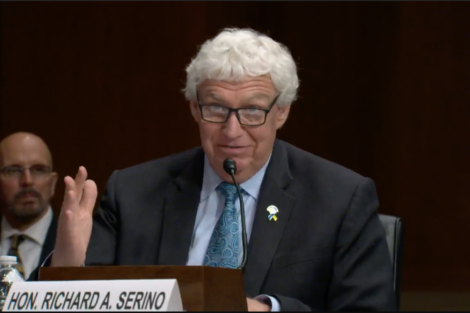May 3, 2023 – Boosting support for public health, emergency managers, and the emergency responder workforce is key to being prepared for future disasters in the U.S., according to Harvard T.H. Chan School of Public Health’s Rich Serino.
These are the takeaway lessons from the 2013 Boston Marathon bombings, Serino testified at an April 26 meeting in Washington, D.C. before the U.S. Senate Subcommittee on Emerging Threats and Spending Oversight, part of the Senate’s Homeland Security and Governmental Affairs Committee.
Serino, distinguished senior fellow at the National Preparedness Leadership Initiative and an instructor in the Department of Health Policy and Management, served as the deputy administrator of the Federal Emergency Management Agency (FEMA) from 2009-14, and before that as chief at Boston EMS (Emergency Medical Services). He played a key role in responding to the bombings that rocked Boston a decade ago.
Serino emphasized the importance of supporting the emergency response workforce—EMTs, paramedics, police officers, firefighters, health care workers, emergency managers, and public health workers. “Without taking care of this workforce, with adequate mental health services, workplace conditions, strong leadership, and cross-functional collaboration so they do not feel abandoned, we are leaving the United States exposed to catastrophic future attacks being left unanswered both in the context of lives and economic well-being,” he said.
It’s also crucial to boost the nation’s underfunded, understaffed, and overburdened public health system, Serino said.
Listen to or read Rich Serino’s testimony: Lessons Learned: 10 Years Since the Boston Marathon Bombings
Learn more
Lessons learned from the Boston Marathon bombing, 10 years out (Harvard Chan School feature)
